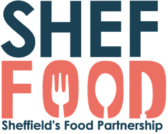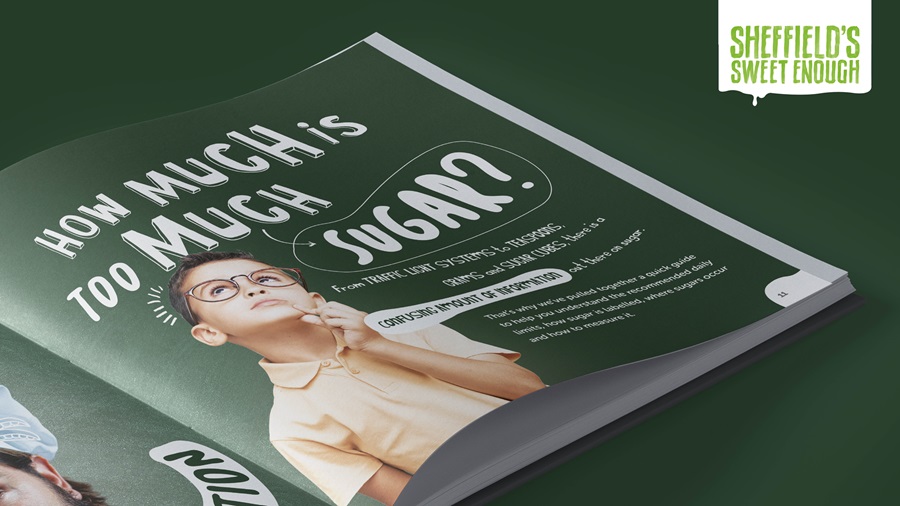Sugar is a topic that often hits the headlines. It’s been linked with everything from obesity to heart disease and been the subject of numerous parliamentary debates and public health directives. No city in the world has escaped its impact, but one city is doing more than most to tackle it.
For the last five years, Sheffield City Council and its partners have championed the Sheffield is Sweet Enough initiative to help local families, businesses, schools and healthcare professionals address the harms caused by eating too much sugar.
“We’re not saying you should never eat sugar – because that’s practically impossible. It’s just about raising awareness about how much sugar is in certain food and drinks.”
– Lisa Aldwin, Eat Smart Sheffield
Educating the public on how much sugar is too much
Working alongside the NHS, Sheffield universities, Trading Standards, food partnerships like ShefFood and the voluntary sector, Sheffield is Sweet Enough shares helpful facts, recipes, swap ideas and advice for people of all ages. The main communication comes from a central website supported by ongoing promotional campaigns. We’re always hearing about safe alcohol guidelines, but how much do you know about sugar allowances? When the council conducted its initial research, the results were surprising. Most people had no idea that babies and children under four were meant to have no added sugar at all in their diets.
Added sugar, or ‘free sugars’, are sugars that are added to food and drink to make them taste better, as opposed to naturally occurring sugars found in fruit and milk. This is the NHS’ maximum recommended daily limit of ‘free sugars’ by age group:
| Age | Daily limit in teaspoons | Daily limit in grams | Equivalent to (approx.) |
| 0-3 years old | 0 | 0g | Fruit, veg, milk |
| 4-6 years old | 4.5 | 19g | 50g frosted flakes |
| 7-11 years old | 5.5 | 24g | 1 doughnut |
| 11+ years (including all adults) | 7 | 30g | Half 500ml bottle of cola |
Thirty grams of sugar a day might sound like a lot, but when you consider that one can of cola contains thirteen teaspoons of sugar, it’s easy to quickly consume an unhealthy amount. The Sheffield is Sweet Enough website shares useful information to help parents make informed decisions for their children, including how to spot hidden sugars and read misleading food labels.
Finding low-sugar alternatives to sweet snacks
Consuming too much sugar can lead to food related ill-health such as tooth decay, obesity and other health problems In Sheffield, having a poor diet and being overweight is contributing to the rising number of people living with Type 2 diabetes and high blood pressure.
One of the main aims of the Sheffield is Sweet Enough initiative is to help people find healthier alternatives to sweetened food and drinks. Whether that’s through sugar swap suggestions and recipes, workplace incentives or signposting in the city’s cafes and restaurants.
Launched in 2022, The Sheffield Family Guide to Smart Sugar Swaps is a low-sugar cookbook written by local people for local people. It’s full of great ideas for breakfast, lunch and dinner, as well as healthier drinks and snacks, which are easy to make for all skill levels.
“I love the work Sheffield is Sweet Enough does in helping families and schools to eat better. Being featured in the cook book with my daughters made us all very proud and seeing my girls talk about it, being proud to advocate healthy eating was the cherry on the top.”
– Viki Garbett, Twiddle Food
As nutritious foods cost more per calorie than unhealthy ones, it’s never been harder to consume a nutritious diet.
This is why we have developed a ‘Feed your Family for Less’ booklet which is available on the website. It’s full of money-saving tips, tricks and affordable recipes that are low in sugar. Teaching children about sugar from an early age, along with being aware of misleading food labelling can help them make informed choices and adopt healthy habits that set them up for life. Sheffield is Sweet Enough has been working with local nurseries and schools, designing a range of fun assemblies, lesson plans, activities and coffee mornings to raise awareness on sugar.
To spread the message even further, ‘Beat Sugar Bingo’ was created and run as a pilot scheme in local businesses. It involved an interactive daily game of bingo with low-sugar tips and the chance to scoop a grand prize. Keeping the message positive and inclusive has helped to engage communities from all corners of the city and lay the foundations for a healthier future.
If you’d like to show the world that Sheffield is Sweet Enough and help more people eat less sugar, you can get ideas and download support materials at https://www.sheffieldissweetenough.org

